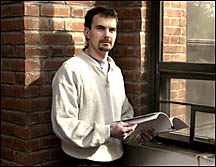|
|
|
|
|
|
INSIDE IOWA STATE February 15, 2002 Examining school choice
Children. Choice. Competition. Innovation. Collectively, these words define the research interest -- school choice -- of Christopher Lubienski, assistant professor of curriculum and instruction. Lubienski researches school choice in the United States and other nations. His work includes historical and international comparative studies of education policy. He studies how and why the different systems come into being, and what educational goals they pursue. "School choice is on the cutting edge of social policy," he said, "and quite controversial." Recently, Lubienski examined more than 100 studies on independent charter schools and similar schools in other nations to see how devolution (decentralizing authority), choice and competition are changing what's happening in the classroom. Charter schools are publicly funded, but run independently from established boards of education. They first appeared in Minnesota in the early 1990s. Approved in 38 states, charter schools do not exist yet in Iowa. Some charter schools are operated by for-profit companies and, ideally, all are accountable to market forces. Charter schools often are accused of taking the best students from school districts, Lubienski said. He concluded that while school choice reformers tout "innovation in the classroom" as a major goal of charter schools, that isn't always the result. "There is often a lot of innovation at the administrative level," Lubienski said. "There are new ways of looking at employment and marketing, such as advertising campaigns. But in the classroom, practices are quite similar to those seen in public schools." Lubienski said some autonomous schools seem to get "captured" by the competitive environment and focus on copying successful programs in other schools, rather than on developing new concepts themselves. "They have the opportunities and incentives to innovate," he said, "but often use that freedom to do things that are rather familiar." Several options Other school choice options Lubienski looks at are home schooling and vouchers. Home schooling is a broad and increasingly popular movement used by parents for a variety of reasons -- from religious and social concerns, to a strong desire to individualize instruction for the child. In the voucher system, public and private schools compete against each other to attract students and the publicly funded voucher that comes with each student. Iowa does not have a voucher program, but is among a handful of states (and the number is growing) that provide tax credits for such choices. Some inner-city school districts have used vouchers to encourage lower-income families to seek education in more desirable school settings. Lubienski said that the results of these programs are hotly debated. "There is mixed evidence on academic gains for children in these programs," he said. "But there is some concern that increased segregation results, leading to overall declines in social and academic indicators." Charter schools and the larger issue of school choice have impacted public education, Lubienski said. "Schools are becoming more responsive to parents," he said. "They are re-orienting themselves to focus on consumers. However, we need to ask: Are schools businesses?" Schools also are borrowing a page from the home schooling movement by focusing on back-to-basics curricula, embracing older but neglected methods like the Montessori approach (stressing self initiative), or developing new systems of delivering education over the Internet, Lubienski noted. Redefining "public" Many school choice advocates argue for an expanded concept of what "public" school means, he said. They believe that private and independent schools can better serve families in many instances. Therefore, they argue, these schools should be considered "public" because they serve the public, and should receive public funding. Lubienski said mid-19th century reformers established the popular definition of public schooling based on public access, funding and governance. The system was based on the idea that taxpayers funded the schools and ought to have some say in school governance, he said. "In that sense, tax money for schools outside public control could be considered taxation without representation." In the 1960s and 1970s, liberals and some Marxists endorsed the idea of vouchers to empower poor families. Today, conservative agendas focusing on family values have embraced these reform movements. Many associate the voucher idea with Milton Friedman's writings in the 1950s and 1960s, Lubienski noted, but the voucher idea for education actually goes back to the writings of Adam Smith and Thomas Paine. Looking ahead On the horizon, Lubienski said, is online home schooling and for-profit charter schools that could encourage further privatization of education. "The wave of the future may be tax credits to support educational choice," he said. "This is a reality in Iowa, and it's attracting the attention of policymakers throughout the U.S." Lubienski also noted that while people seem to embrace the concepts of charter and voucher systems in polls, those same ideas "tend to get trounced" when they appear on ballots. "That's when people consider choice not as an abstract ideal, but as a reality with immediate repercussions for them." Originally from Michigan, Lubienski came to Iowa State in 1999 with his wife, Sarah Lubienski, also a member of the curriculum and instruction faculty, and two daughters. Iowa's emphasis on public education weighed heavily on their decision to move their young family here. "This is a great time and place to be studying these issues," he said. |
|
Ames, Iowa 50011, (515) 294-4111 Published by: University Relations, online@iastate.edu Copyright © 1995-2001, Iowa State University. All rights reserved. |
